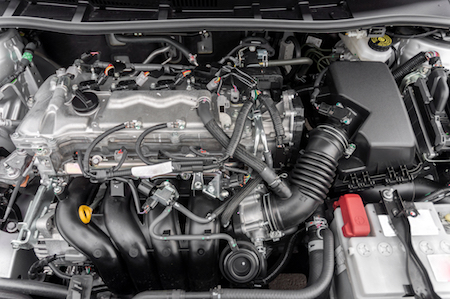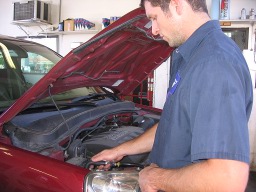There’s something about driving your car for the very first time.
When you drive it off the lot, everything feels fresh and new. The smell. The touch. Even the way it drives, responding instantly to whatever move you make.
Then you fall into patterns. You drive. And slowly, your vehicle wears down.
Are you paying attention?
That’s why manufacturers have established a car maintenance schedule for every vehicle on the road. If you follow their guidance, you can protect the systems needed for a smooth ride. You prevent damage to the engine, which causes premature damage and wear.
Why a car maintenance schedule is important
Human nature has the belief: If it ain’t broke, don’t fix it. We don’t look for problems, we wait until they surface.
For some things, that works. For your vehicle, it doesn’t.
Do you really want to ignore your brakes until they “break?” Imagine the problems that would create if you’re on your way home from a day of skiing in the Rocky Mountains.
Or what about engine failure? What if that happens late at night as you’re coming home from a road trip, out in the middle of nowhere?
According to the Automotive Aftermarket Industry:
- The average age of a vehicle in the US has increased by 17 percent in the past ten years
- People are holding on to their vehicles, both new and used, 60 percent longer over the past ten years
 The longer you own a vehicle, the more maintenance it’s going to need.
The longer you own a vehicle, the more maintenance it’s going to need.
The same report shows older car owners are twice as likely to expect to spend more than $1,000 on a repair, and they are more aware of the work that needs to be performed on a regular basis.
Do you fall into that category?
The people that manufacture your car know everything about your car. Why not trust them to guide you towards the best car maintenance schedule you can follow? It will help you:
- Save time by being stranded without a vehicle
- Save money by addressing concerns before they blow up to bigger problems
- Improve safety by assessing vehicle conditions before they cause you harm
- Maintain the resale value of your car by keeping it in top condition
- Create a record of work performed, something that can be invaluable when you decide to sell
What a typical car maintenance schedule looks like
The best place to find out more about your vehicle is by checking your owner’s manual. If you don’t have access to that, let Google be your guide. Simply type in your make and model into Google, and you’ll find a wealth of information pertaining to your car.
Of course, that’s just a starting point. The timing of maintenance intervals depends on a variety of things, such as make and model, how many miles you put on each year, road conditions, driving skills, and more.
What you’ll find are general guidelines. But if you talk with one of our mechanics about your own unique driving patterns, we can help you adjust them to fit better with your lifestyle.
Someone driving down the hill to work each day will have a different maintenance schedule than someone who works from home, logging just a few thousand miles each year running errands around town.
Typically, you can plan on servicing your vehicle about every 30,000 miles. This is a great time to schedule a service appointment to allow a mechanic to evaluate the different systems in your car. They will handle:
- Replacing the engine air filter
- Rotating the tires
- Changing engine oil and replacing the filter
- Inspecting the coolant system, adding coolant and replacing hoses as necessary
- Inspecting the braking system, replacing pads and rotors as well as brake line and hoses
- Inspecting the exhaust system to ensure it’s working correctly
- Inspecting the transmission system for proper gear placement
Of course, that’s in addition to other routine maintenance visits you should plan out over time.
Every 3,000 to 7,000 miles – every manufacturer will recommend you get an oil change on a regular basis. This flushes new oil throughout the system, and replaces dirty oil filters. Furthermore, it allows a mechanic to take a look for other potential problems as well. Be aware that other fluids such as windshield washer fluid, new wipers, tire checks, and things like coolant and transmission fluid should be checked periodically as well.
Every 15,000 to 30,000 miles – be sure to check your battery during this time. Especially new batteries that come with a new car, they aren’t expected to hold their charge beyond the first couple of years, or 15,000 to 30,000 miles, whichever comes first. You should also chick coolant, hoses, filters, the heating and cooling system, brake pads, and all suspension parts.
Every 35,000 to 50,000 miles – start paying attention to the individual parts throughout your vehicle. Continue to check the battery regularly. Replace spark plugs and wires. Inspect the ignition system. Verify the suspension system is working well.
Every 60,000 miles – it’s time for a full-blown inspection. The older your vehicle gets, the more important it is to bring it in for regular maintenance visits. This gives one of our mechanics the chance to learn your car, and to work with you on creating a schedule for maintenance and repair.
What really impacts car maintenance schedule requirements
It’s worth mentioning again that it isn’t just the mileage you put on your vehicle that determines how frequently it should go in for inspections and repairs. Sitting and not operating are equally tough on your vehicle, just in different ways.
Factors that impact what type of maintenance should be performed include:
How you drive – are you aggressive? Do you push the limits? Do you rarely drive? Your driving behavior will impact which systems wear out quickly, and how your vehicle responds to different maintenance items.
Where you drive – Colorado can be hard on cars. They are exposed to extreme heat and cold, sometimes within days of each other. They face snowy roads, mag-chloride spraying up from the roads, rocks chipping away at the undercarriage. The harsh sun beats down on it almost every day. And then there’s mountain driving. How frequently do you head up into the hills? That can take its toll on how well systems like your brakes fare over time.
Your vehicle – parts matter. Of course, you can find cheap parts online. You can do things yourself, opting for the lowest priced components you can buy. But it will matter in the end.
Your vehicle is something you use every day. It’s a matter of safety for you, your family, and others out on the road.
Are you following your car’s maintenance schedule?
Or are you leaving it to chance?


